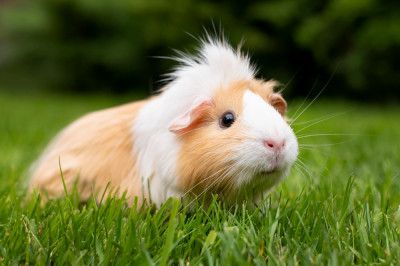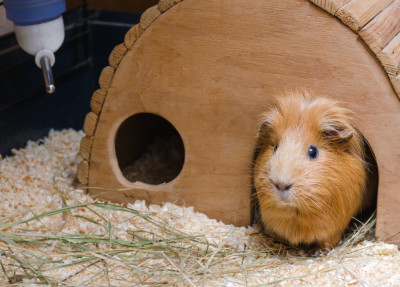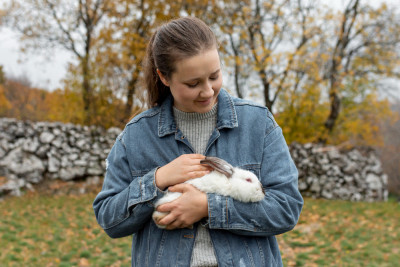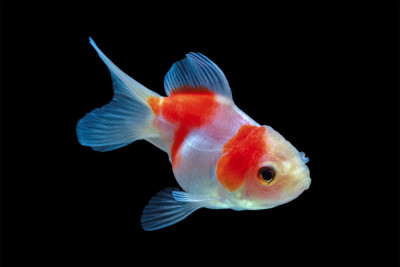Understanding Small Mammals as Pets
Small mammals encompass a diverse group of animals that includes rodents, rabbits, and certain small carnivores. They are known for their compact size, short lifespans, and distinctive behaviors. Before bringing a small mammal into your home, it's essential to understand the following aspects of small mammal ownership:
1. Commitment and Lifespan
Small mammals typically have shorter lifespans compared to larger pets like dogs and cats. Depending on the species, you may expect a pet's lifespan to range from one to eight years or more. Be prepared for the commitment required throughout their lives.
2. Habitat and Environment
Different small mammal species have varying habitat requirements. Some are burrowers, while others are climbers or grazers. Understanding your chosen species' natural habitat is essential to provide a suitable environment.
3. Diet and Feeding
Small mammals have diverse dietary needs. While some are herbivores, others are omnivores or insectivores. Understanding your pet's dietary preferences and nutritional requirements is vital for their health.
4. Health and Care
Regular veterinary check-ups and proper hygiene are critical for small mammal health. These animals can be prone to specific health issues, so early detection and care are essential.
5. Legal Considerations
Certain small mammal species may be regulated or prohibited in some regions due to ecological concerns or potential zoonotic diseases. Always ensure that you are in compliance with local laws and regulations when considering a small mammal as a pet.
Choosing the Right Small Mammal Species
Now that you have a basic understanding of the responsibilities that come with small mammal ownership, let's explore different species commonly kept as pets and their unique characteristics:
1. Hamsters
Hamsters are among the most popular small mammal pets. They are nocturnal, solitary animals known for their burrowing behavior. Common pet hamster species include the Syrian Hamster and Dwarf Hamsters.
Pros:
- Compact size, ideal for small living spaces.
- Low maintenance and relatively easy to care for.
- Enjoyable to watch during their active nighttime hours.
Cons:
- Generally solitary and territorial, so they are best kept alone.
- Short lifespan of around 2-3 years.
2. Gerbils
Gerbils are social animals that thrive in pairs or small groups. They are active during the day and known for their digging and tunneling behaviors. The Mongolian Gerbil is a common pet species.
Pros:
- Social creatures that enjoy the company of their own kind.
- Highly active and entertaining to watch.
- Longer lifespan compared to hamsters, averaging 3-4 years.
Cons:
- Require a larger habitat with plenty of space for digging.
- Need companionship, so it's best to keep them in pairs or small groups.
3. Guinea Pigs
Guinea pigs, often referred to as "cavies," are gentle and sociable rodents. They are larger than hamsters and gerbils and have distinctive vocalizations. Guinea pigs come in various breeds and coat types.
Pros:
- Friendly and enjoy human interaction.
- Longer lifespan, averaging 5-7 years or more.
- Social animals that thrive in pairs or small groups.
Cons:
- Require a spacious enclosure with ample room for exercise.
- Need daily access to fresh hay and vegetables for a balanced diet.
4. Rabbits
Rabbits are charming and intelligent small mammals. They come in various breeds and sizes, making them adaptable to different living spaces. Some common pet rabbit breeds include the Holland Lop, Netherland Dwarf, and Mini Rex.
Pros:
- Can be litter trained and are relatively clean animals.
- Can form strong bonds with their owners.
- Lifespan of 7-12 years with proper care.
Cons:
- Need ample space to hop and play, both indoors and outdoors.
- Require a well-rounded diet that includes hay, fresh vegetables, and pellets.
5. Ferrets
Ferrets are lively and curious small carnivores. They are known for their playful nature and mischievous antics. Ferrets are highly social animals that thrive on interaction and exploration.
Pros:
- Energetic and entertaining to watch.
- Form strong bonds with their owners.
- Lifespan of 6-10 years or more.
Cons:
- Require a dedicated and ferret-proofed living space.
- Need regular mental and physical stimulation to prevent boredom.
Making an Informed Decision
Choosing the right small mammal companion involves considering your lifestyle, available space, and preferences. Here are some steps to help you make an informed decision:
1. Research Extensively
Take the time to research different small mammal species thoroughly. Learn about their natural behaviors, dietary requirements, and care needs. Understanding their habits and characteristics is crucial for providing a suitable home.
2. Assess Your Space and Resources
Consider the space you have available for your small mammal's enclosure or habitat, as well as your budget for their care. Factor in the costs of bedding, food, toys, and veterinary care.
3. Evaluate Your Experience Level
If you're new to small mammal ownership, it's wise to start with a species that is beginner-friendly and forgiving of potential mistakes. More experienced keepers may explore species with more specialized care requirements.
4. Interact with Potential Pets
Whenever possible, interact with the small mammals you are considering. Observe their behavior and health at the store, rescue, or breeder's facility. Healthy small mammals should be active, alert, and free from obvious signs of illness.
5. Consider Adoption
Consider adopting a small mammal from a rescue organization or adopting a pet that needs rehoming. Adoption can be a fulfilling way to provide a home to a small mammal in need.
6. Consult with Experts
Seek advice from experienced small mammal keepers, breeders, or veterinarians. They can offer valuable insights and guidance based on their expertise.
Conclusion
Small mammals make delightful pocket-sized companions for those who are willing to invest time, effort, and love into their care. Whether you choose a hamster, gerbil, guinea pig, rabbit, or ferret, your small mammal friend can provide you with a unique and rewarding pet-keeping experience. Remember that with the right knowledge and dedication, you can create a thriving environment for your chosen small mammal companion, ensuring both their well-being and your enjoyment of their company for years to come.







